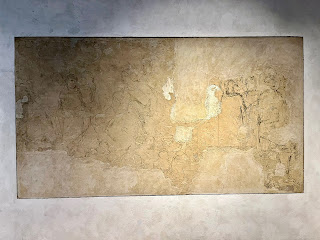On not reading (series: notes to myself)
I have not read enough.
I said this with a sense of inevitable guilt. It’s not merely for lack of time, although that has played a role. It is not only tiredness, now that I have too many other preoccupations and I look for distractions, not more reflections, at night. It is not just because of a sense of unease pleasure, in which one may not indulge without moderation, like drinking good red wine. It is mostly because of a persistent sense of apprehension. Reading is formatting one’s mind, and this is risky, almost dangerous. For a convincing book may kill a tender idea you were nourishing, implanting a new one that is not yours, like a smuggled species on a new island. An insightful book may create turbulent thoughts almost unpleasant, that keep your mind rocking day and night. An interesting book may trigger a chain reaction that will disrupt your malleable reasonings, not yet sedimented. New bits of semantics will pin-pong in the head, interfering with other essential reflections. Reading is inviting the thoughts of someone else in your own mind. You need to be prepared. Not everyone is welcome, and few should be allowed to stay. So, reading must be done carefully, when ideas have been formed and can withstand the strength of a classic, like a tree with strong roots clawing the depths of the earth, against a powerful wind. And it must be administered parsimoniously, lest it generates an excitement that may lead you astray.
I have read again.
A few authors, like Homer, Dostoevsky or Borges, with the excuse of different translations. Some other times, because I wanted to read them to you, like Euripides, Lucretius, Calvino, or Lampedusa. Often because I wanted to make sure I understand them, like Plato, Descartes, or Kant. Of my re-readings, I have no regrets. There are books like The Leopard that need to be read at least three times: when you are young and adventurous; when you are middle-aged and busy; and when you are old and reflective.
I have stopped reading.
Most books should not be read: they are shallow, silly, pretentious, boring, fake. I read some of those. I learnt too late in life to be firm, to give no quarter, offer no second chance. I learnt the hard way: I have finished reading too many books that did not even deserve to be started, only because the first page had been turned. Mistakes followed more mistakes, and thousands of pages have piled up on my conscience. I thought that perseverance was the virtue to be exercised. I did not understand that fairness was instead way more important. For I have learnt to sacrifice a book and leave it unfished not by judging it in itself, but by giving a chance to the one I have not yet opened. So now I listen to that quiet voice that wonders whether something infinitely more deserving may be on the shelf. The test is simple: if I ever wished I had already finished the book in my hands to be able to get another, it is time to close it, place it next to those that have disappointed, and move on. I have now abandoned hundreds of books. Many must be condemned to oblivion, for few to be saved in one's own memory.







"Reading is formatting one’s mind, and this is risky, almost dangerous."
ReplyDeleteI like this, because it is true. Biblioclastia is always under the corner.
If I can make a suggestion, this video (in Italian) from a very good friend of mine is a way to remember it: https://www.youtube.com/watch?v=EVL8Xbr4BVA
If this is not the place, I beg your pardon, let me know and I will delete/edit this post.
I agree with you, and I dare to push your thinking a bit over: what about magazine's articles, or blog posts, or movies, or TV series, or videogames, or... people? Can we behave with boring, annoying, disappointing people the same way we should behave with books? Or with people, since we are always changing, we can hope that even the last conversation, the last message can really bring us hope, new ideas, better understanding?
I am younger than you, and for me it is still important to finish a book (I left unfinished probably just a dozen in my life), always hoping that even in the last page I can find something enlightening or important to remember.... but then I realise (especially in the last years), that I have read too many words and I barely remember the ideas behind them or even the authors. I know I read a lot of Hemingway when I was younger, I do not remember anything about him (probably vaguely only "The old man and the sea"). And I have no will to read it again, considering also the huge amount of analogue and digital words that I already own and I have planned to read (and some of them to read again for my own pleasure).
Should I also mention the "sunk cost fallacy"?
I should really decide in advance which book/film/videogame is worth my precious time and which of them are allowed to "format" my mind, but in order to do it I should read them or leave someone else decide for me. In any case, it seems to me a "catch 22" paradox.
Any suggestion? :)
PS: I don't want to stop reading. :)